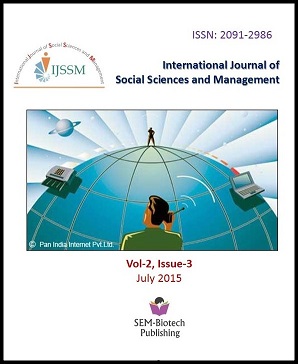Testing the Greatest Management Principle (GMP) for Effective Transformation of the Sub-Sahara Africa-An Emperical Evidence from Nigeria
DOI:
https://doi.org/10.3126/ijssm.v2i3.12596Keywords:
Testing, Greatest Management Principle, Effective Transformation, sub-Sahara Africa.Abstract
The poor recognition of the critical role human beings play in the realization of organizational goals has led to consistent poor performance of organizations especially in the Sub-Sahara Africa. No meaningful transformation can be achieved if the human element in production process is toiled with, used and abandoned. This paper empirically investigated the claim by Michael LeBoeuf in his Greatest Management Principle Model in the world that “what gets rewarded gets done.” 87 respondents participated in the survey of the 13 ministries in Anambra State Civil Service. The instrument was adequately validated and its reliability duely established. The hypothesis of the study was tested using Z-Statistics to discover the difference between two means of the main variables of the study. The results showed that the cumulative mean of positive behaviours rewarded is 3.80 while the negative behaviours rewarded is 2.44. This made the null hypothesis to be rejected while the alternative was accepted. The significance of the difference was authenticated using the values of the standard errors. The findings of the study is that when employers reward positive behaviours in relation to the objectives of the organization, positive response would come from the employees. This was found to increase the performance of the employees. The study recommended among other things that the rewards employers give to employees must flow out of the objectives of the organization.
Int. J. Soc. Sci. Manage. Vol-2, issue-3: 236-243
DOI: http://dx.doi.org/10.3126/ijssm.v2i3.12596
Downloads
Downloads
Published
How to Cite
Issue
Section
License
This license enables reusers to distribute, remix, adapt, and build upon the material in any medium or format for noncommercial purposes only, and only so long as attribution is given to the creator.




